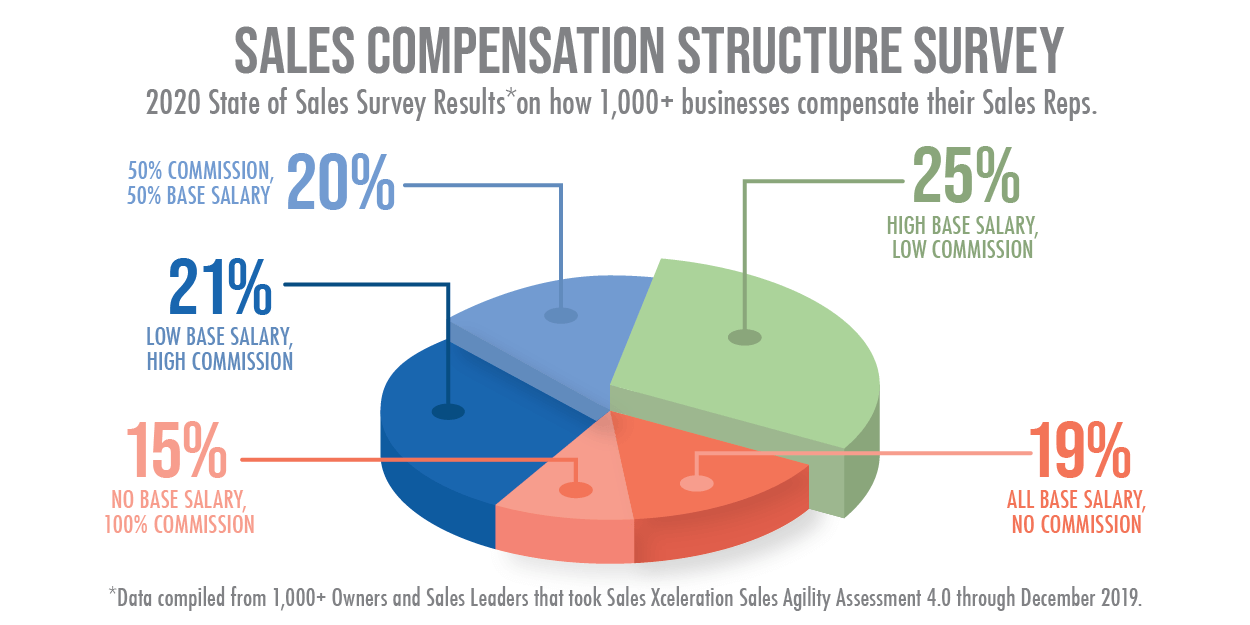A sales compensation plan is an important factor in your company’s ability to attract, recruit, and retain a sales team that produces results. While a sales compensation plan is a vital component, it can be challenging to structure it just right.
Are you among the 78% of small-to-mid sized businesses that feels their sales compensation plans are not generating desired results? *
As an Outsourced VP of Sales, I routinely consult companies on this topic. So don’t worry – you’re not alone if you find this area challenging. I have found that Owners and Sales Leaders want to compensate their salespeople in a performance-based manner that is positive, motivating, and competitive to help the team and company reach their sales goals. However, their struggle with developing a fair and effective sales compensation plan lies in the ability to factor in a variety of business complexities while also meeting net income objectives.
Below illustrates a sizable sample group of businesses split almost evenly in fifths on how they compensate their salespeople. The thing 78% of them have in common is that they are not getting desired results from the model they are using.

When exploring these diverse sales compensation approaches, I am commonly asked:
“Which one is right?” The answer is: “It depends.”
It’s not a great answer and probably not the one you were looking for, but there is a deeper strategy involved in formulating an on-target sales comp plan that aligns properly to your business model. The only certainty is that a variety of business factors need to be considered to derive the best plan for your organization and team.
The art behind designing a strong Sales Comp Plan is asking the right questions. Probing into various aspects of your business helps isolate the key objectives that you need to account for when designing your compensation model. The below examples may not match-up identically to your sales environment, but they can serve as a platform to build from to structure your plan correctly.
NATURE OF BUSINESS
- Recurring Revenue
- Transactional – high volume, low-touch
- Enterprise Solution – strategic, long sales cycle
- Partner or Channel related
CONSIDERATION FACTORS
- Customer Lifetime Value
- Sales Rep involvement after initial sale
- Sales cycle length
- Average transaction value
- Correlation of Gross Margin to Sales Payout
- Financing versus Purchase Outright
- Recurring Revenue component
- Key milestones in complex Sales Process
- P&L constraints
- Others customized to your unique environment
Before finalizing your sales budget, consider an expanded compensation strategy to engage all customer-facing teammates. By defining your customer life cycle, you will expose selling opportunities in several positions across your organization. Establishing performance-based compensation incentives for all sales contributors has proven to have positive impact. This is accomplished by including those focused on new business development, those dedicated to account management, as well as anyone outside of the sales department that plays a role in customer retention and advocacy.
With a well-tailored sales compensation plan in place, your organization will reap the benefits. It will keep your sales team and those that support customer success and retention motivated to perform at a high level. Your comp plan will require work to develop and needs to be aligned with your business goals to see the greatest success.
MEASURE YOUR SALES ORGANIZATION EFFECTIVENESS
by investing 5-minutes to take my Sales Agility Assessment 1.0.







Leave A Comment